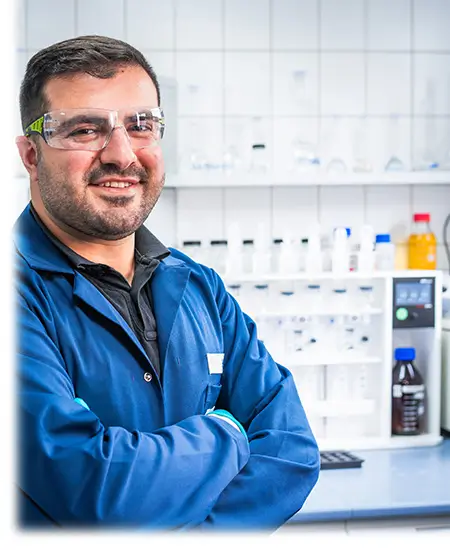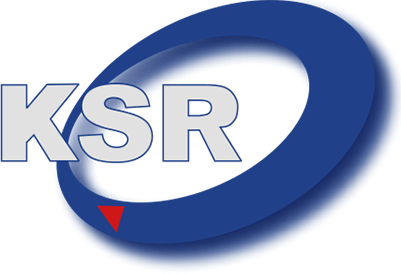- Home
- The KSR Group
- Benefits
- Utilisation of waste from industry and skilled trades
- Disposal and recycling of waste oil
- Comprehensive disposal for vehicle repair shops
- Waste from the automotive sector
- Purification and treatment of wastewater/emulsions
- Treatment of extinguishing water
- Tank and separator residue/sludges
- Laboratory/analytics
- AVV key database
- Products
- Sustainability and the environment
- Contact
- Portal // Customer login
PLANTS AND PRODUCTION STAGES.
Optimised for sustainability.


Liquid waste
Separating plant
Our separating plant separates emulsions and other oil-water mixtures into waste oil and water.
The separated waste oil is piped into the company’s distillation plant. The residual water is further treated depending on its degree of contamination. Highly contaminated water is vaporised in the distillation plant and recovered as a distillate. The residual organic concentrate is disposed of by a partner company that complies with our strict requirements.
Decanting plants
Our decanting plants treat multi-phase mixtures (e.g. sand filter contents) and oily sludge. Waste oil, water and solids are separated during this process. The water is directed to our company wastewater treatment plant, the waste oil to our distillation plant. The solids go to external companies for further expert disposal.
Distillation plants
Our distillation plants recycle waste oils and solvents to create high-quality lubricants and fuel oils that meet DIN quality standards. Solvents are even produced in original quality. This is made possible by having separate distillation lines and ancillary plants (e.g. central energy units, waste air treatment systems). Sedimentation traps positioned upstream of the distillation plants guarantee sediment-free preliminary products, which in turn ensure that the fully automated distillation processes run smoothly.


Solid waste
Solid waste includes consumables containing grease and oil such as oil filters, plastic and metal packaging, and cleaning rags. The oil filters are collected separately and shredded. The waste oils are centrifuged off and treated in the company’s distillation plants. Steel scrap is sorted out using magnet separation and supplied to the steel industry. Cleaning rags and dirty paper fractions are included in thermal utilisation. The plastic fractions in the mixture are shredded and passed on for further recycling.


Hazardous waste
Waste that cannot be utilised at KS-Recycling GmbH & Co. KG is collected in a special interim storage for hazardous waste in accordance with specifications. This includes the authorised waste types for KS-Recycling GmbH & Co. KG according to the waste catalogue approved by the Federal Immission Control Act (BImSchG) and based on the Waste Catalogue Ordinance (AVV).
This is documented via a verification procedure that is required by law and authorised by the authorities depending on the type of waste. Weights are determined using calibrated vehicle scales.


Wastewater
The Sonsbeck wastewater treatment plants are used to treat the company’s own production wastewater from the processing of waste oil and used solvents by distillation and to treat industrial wastewater acquired from third parties. The wide spectrum of treatment plants includes the physical treatment of wastewater and sludge containing sediments, the physico-chemical separation of oil and water, emulsion separation and the total vaporisation of wastewater. Based on sources of origin and/or our waste disposal spectrum, the highest proportion here is attributable to organically contaminated wastewater – however, extremely contaminated organic raw wastewater and flashpoint-contaminated wastewater can also be accepted and processed.
The industrial wastewater treated in the Sonsbeck plants is brought to the nearby site in Wesel and, following biological treatment in one of our company plants, released into the Rhine river. Our wastewater biological treatment is an elaborate special process in which specialised bacteria populations are adapted or settled in a number of sequentially connected aerobic fixed-bed reactors. These specialised bacteria populations are able to break down and degrade even high-molecular, persistent hydrocarbon compounds which in conventional wastewater biological treatment merely pass through as ‘inert CODs’. This special process ensures that, even in the case of raw wastewater with high organic contamination, only very minimal residual loads are released into the Rhine.


Recycling depot
Our recycling depot is an area within our entire plant in which large skips (7–40 m³ volume) are available for receiving, separating and sorting solid recycling material.
This includes:
- Plastic bumpers
- Mixed plastic fractions (e.g. wheel covers, wheelhouse covers, front cowling, mounting brackets)
- Used tyres
- Film/foil
- Polystyrene
- Paper, paperboard, cardboard, etc.
- Glass
The above materials are sorted and, in accordance with the criteria specified by external treatment facilities, collected into efficiently large transport units. The sorting is necessary in order to adhere to the requirements of the packaging ordinance, i.e. returning specific quotas of individual recycling materials from trade and industry.
Paper, paperboard and cardboard fractions are compressed using a pressing device to ensure that the volume weight for transport is cost-effective and ecologically sound.


Laboratory
In order to be able to utilise incoming waste in a correct and environmentally sound way, its composition is qualitatively and quantitatively analysed by our specialists in the company’s own physico-chemical laboratory, which is designed for petrochemistry and water chemistry analysis.




